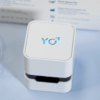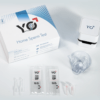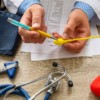Daniela and Jocelyn’s Story
Daniela and Jocelyn are a lesbian couple from New Jersey who is starting a family and learning fast about the world of assisted reproduction and same-sex fertility on their journey. They have seen doctors, tried at-home solutions, and have carefully considered all options as they start trying to conceive. We sat down with them to learn more about their experience:
Can you describe the route you took (or will take) to create your family?
“Initially, we were advised to do IUI, Intrauterine Insemination. But ultimately, we decided to start by trying ICI, intracervical insemination, because we felt IUI seemed a little impersonal for us. We have decided to try ICI at-home insemination with donor sperm for one year (give or take). If that proves to be unsuccessful, we will go back to our fertility specialist for IUI.”
How did you choose your sperm donor?
“Choosing a donor was not an easy process. We searched online cryobanks and websites for quite some time. Daniela had some trouble connecting with the donor profiles and choosing one. Then one day, we had a light bulb moment and thought of an old friend we hadn’t seen in some time and wondered if he would be interested in helping us make our baby. We worked up the courage to ask him, and he was very eager and excited to help us with this process.”
What is the experience like with the fertility clinic?
“Our experience in the fertility clinic was overall good. Daniela is carrying, so we went in and received initial health screenings and talked about coming up with a plan with our doctor. When we shared with him we were interested in ICI versus IUI, he seemed a little frustrated. He feels strongly that IUI would be more beneficial to us. But, IUI felt so sterile to us, Jocelyn would not be allowed to be present with Daniela during her IUI procedure (due to covid restrictions, understandably so). Daniela really did not want to get dropped off at the doctor’s office by her wife and come home pregnant with no involvement from her spouse. This is a process we want to do together and that is why we chose to start with ICI at home so we can both take part in creating our baby.”
How do friends and family react when you tell them you wanted to start a family?
“I can honestly say, there are mixed reactions from both friends and family. Most loved ones when they hear about our journey are instantly over the moon ecstatic. Some loved ones seemed to be mildly offended that we started such a huge journey or process and did not fill them in on things sooner. To us, starting this process was very personal. We needed to decide between ourselves how we wanted to conceive, who we wanted to help us, and when it was the right time to share it with others. Most couples, regardless of their sexuality, do not share with their family and friends when they are trying to conceive, they only share the news that they are pregnant! For us, it was a little more complex than that, which eventually is what our loved ones had to come to understand.”
Have you or others faced any stigma or negativity?
“Throughout our relationship, we have had to overcome many challenges to get to where we are today. Although not all the people we have come to surround ourselves with beat-to-the-unconventional-drums that we do (leading to some very off-the-wall questions or looks) for the most part, everyone has been respectful and supportive of our decisions in their own way. We get that for some, what we are doing is foreign and unknown territory and we really want to shed light to bring understanding to the MANY possibilities for same-sex conception.”
What is the best part of the experience for you or others?
“We would have to say that the best part of this experience for us so far is the ability to open up to one another and continually learn new things throughout this process. The highs and lows of the TTC journey has brought so much strength to our marriage and with every new opportunity we feel more confident we are growing into the best parents we can be.”
Do women face any hardships during the fertility journey?
“It’s a very emotional journey with many highs and lows. There are many times, especially in today’s world where first-time success is idolized with millions of subscribers, it can be discouraging to know that it is possible for some to get pregnant right away, even on the first try. While others, like myself [Daniela who will be carrying], are left wondering, “What’s wrong with me?! Why couldn’t I get pregnant on the first try? They make it look so easy!”
We understand that everyone has their own process and we try not to compare ourselves with others. What we can say is that we do consider ourselves lucky that we haven’t had any miscarriages which is one of the biggest hardships a woman can face during the fertility journey.”
Do women have to take hormone injections prior to egg collection? If so, what is this process like for you or others?
“In order for eggs to be collected by a clinic, there are hormones that women would have to take [ some are oral and some are injections, we believe every woman’s journey would depend specifically on what her and her trusted medical team decide is best]. At this point in our conception journey, we are not choosing to have our eggs collected, instead, we are tracking the natural ovulation cycle of Daniela’s body in order to artificially inseminate at the right time so hormones aren’t needed or suggested. Daniela has currently only added over-the-counter prenatal vitamins, vitamin C, and Vitamin D to her daily intake.”
Do you know of any useful online groups or forums that help people find information?
“As a matter of fact, we have started a YouTube channel in order to share all the useful resources and information we have learned regarding artificial insemination and same sex conception in hopes to help others on their TTC journey. Some resources that we found helpful were: coparent.com, prideangel.com, seattlespermbank.com, californiacryobank.com, betterhealth.vic.gov.au. We have also joined Facebook groups that have been helpful.”
What advice would you give to people at the beginning of their fertility journey?
“We think it is important to know that there are SO MANY ways a person can grow their family. Sometimes the biggest thing standing in our way is our own lack of ability to let go of what we think is “supposed to” happen and just embrace the world of opportunity as they present themselves. Do what works best for you rather than giving into the notions of what is expected of others or society.”
Daniela and Jocelyn have a YouTube channel where they discuss the highs and lows of their fertility experiences: Lesbi-Honest with Daniela & Jocelyn. Follow them to stay current on their Journey!
The Trans Experience
Daniela and Jocelyn taught us a lot about the same-sex adventure when Trying to Concieve. Another key group in the LGBTQ+ community is, of course, transgender individuals. Fertility clinics can be an uncomfortable experience for trans people. Transgender females are asked to produce a sperm sample into a cup and discuss the results with a scientist or medical professional. Many can find this situation awkward and upsetting. YO at-home Sperm Testing Kits allow you to test your fertility in the privacy of your own home, without any uncomfortable conversations or samples to mail-in.
From a Current YO Customer:
“I’m a trans woman and wanted to test my sperm, and YO was really hands down the best possible experience I could ask for. I didn’t want to talk to anyone or deal with the transphobia of talking to someone about what was going on, and the un-gendered instructions and coloring of everything involved was fantastic.
I’m also a medical provider and have started to recommend this as a first step test to any of my trans women patients considering fertility testing for all the same reasons. We’re all so anxious about having to go to an office and collect in a cup and have to deal with everyone telling us things about our gender and fertility that are inappropriate. It’s really helped increase access to fertility considerations for a lot of my patients.” -Anonymous
Assisted Reproduction
The invention of IVF has been revolutionary for people in the LGBTQ+ community. It has allowed gay and lesbian couples the chance to have their own biological children by working with sperm donors, egg donors, and surrogates. There are a few techniques that may be recommended if you choose to start your family by visiting a fertility clinic. These include IUI, IVF, and ICSI.
IUI (Intrauterine Insemination)
This method involves either tracking a woman’s natural ovulation cycle or using mild hormonal drugs to stimulate egg development. When the woman has ovulated, she will be brought into the fertility clinic, and prepared sperm (either from her partner or a donor) will be inseminated into her uterus.
With some luck, the sperm should find the egg successfully, and fertilize it. IUI is generally thought of as a relatively non-invasive technique as the woman’s eggs do not need to be removed from her body for pregnancy to occur.
IVF (In Vitro Fertilization)
A woman will grow just one egg each month, in a natural cycle, that will reach the stage of ovulation. In IVF, a woman is stimulated to produce many eggs. The exact number of eggs will depend on the woman, and the strength of the hormonal stimulation, but between 5 and 15 eggs is typical. Once the eggs have reached the correct level of maturity, the woman will have an egg collection, and the eggs she has been growing will be collected and stored safely in an IVF laboratory.
Prepared sperm will be introduced to the eggs and allowed to fertilize. Over the next few days, the fertilized eggs should grow into embryos, which are then transferred back into the woman as an “embryo transfer.” Any remaining embryos of suitable quality may be frozen for use at a later date.
ICSI (Intracytoplasmic Sperm Injection)
The process of ICSI is similar to IVF in some ways. A woman is stimulated to produce numerous eggs, which are retrieved as part of an egg collection. In Natural Conception, IUI and IVF, the sperm needs to penetrate the outside of the egg before fertilization can occur. ICSI procedures bypass this interaction by injecting the sperm directly into the egg. This technique is useful for couples with male-factor fertility issues or couples who have had failed-fertilization previously using IUI and IVF techniques.
Speak to your fertility doctor to see if one of these treatments is suitable for your situation.
Sperm Donors, Egg Donors, and Surrogates
If you are a same-sex couple seeking fertility treatment, you will need to find an egg or sperm donor to assist your reproductive journey. For lesbian couples, you will need to decide which partner wishes to use her eggs and which partner wishes to carry the pregnancy. The same partner can choose to do both of these, or one of you can contribute the egg collection, and the other can have the embryo transfer procedure. It’s entirely up to you! You’ll also have to decide which sperm donor you’d like to use.
Many fertility clinics will have their own in-house sperm bank for you to choose from. Alternatively, there are sizeable international donor banks you can browse. If there’s someone in your life that you know and would like to use as a known donor, this is an option too!
Same-sex male couples will have slightly different decisions to make. They will need to decide which partner will be the biological father and which egg donor catches your eye. Additionally, you will have to find yourself a surrogate who will carry the pregnancy. As with sperm donors, you can either be matched with an egg donor and surrogate you do not know or ask someone from your life to get involved; all options may be considered for this important decision.
It’s important to note that the rules around surrogacy vary significantly between countries and states, so make sure you get all the information you can about surrogacy based on your location.
At-home insemination / ICI (Intracervical Insemination)
Many same-sex couples may have normal fertility levels – they are just missing the sperm or egg needed to make their baby. At-home insemination can be a great starting point when trying to conceive and is often less expensive than traditional treatment at a fertility clinic.
If you choose to try at-home insemination, you will probably consider ICI. This technique is similar to IUI, but instead of sperm being inseminated into the woman’s uterus, it will be deposited at the entrance to the cervix. This process will typically happen during a woman’s natural ovulation cycle, and she will not need to take any stimulatory drugs. ICI can be used by both same-sex and heterosexual partners who are trying to conceive.
As with conventional fertility treatment, lesbian couples will need to source a sperm donor, and same-sex male couples will need to find a surrogate. In the case of at-home insemination, this surrogate must also be willing to donate her eggs as part of the process. This type of surrogacy is called genetic surrogacy, as the surrogate will have a genetic link to the offspring.
Before undertaking at-home insemination, make sure you have the correct documentation in place. This may include a sperm donor or surrogacy agreement. We advise you to seek legal counsel to ensure everything is spelled out and legal ahead of time. Note: if you have been trying to conceive naturally or with an at-home insemination method for over one year and have not fallen pregnant, it may be time to visit with a professional.
Getting Tested Up Front
If you’re planning on trying at-home insemination, it’s essential to put everyone involved through a series of tests for Sexually Transmitted Infections. STIs, like chlamydia or gonorrhea, or viral infections such as Hepatitis B, Hepatitis C, or HIV may spread during the insemination process, leading to nasty side effects or negative implications for the pregnancy. Make an appointment with your local GP to ensure everyone’s got a clean bill of sexual health before embarking on any kind of at-home insemination.
If you’re using a surrogate, it’s essential to ask her to take a pregnancy test before inseminating her with your sperm to make sure she’s not already pregnant! It is also a good idea to ask her to abstain from sexual intercourse with others before the ICI procedure to ensure her egg is fertilized by your sperm. You also need to check that the person providing the sperm has quality swimmers!
There’s no point trying to conceive through at-home insemination if the sperm provider doesn’t have a good number of motile sperm. Why not try our FDA Cleared, Doctor Approved YO Male Fertility Test Kit from the comfort of your own home?
If your Motile Sperm Count or YO Quality Score comes back on the low side, don’t worry, there are plenty of things you can do to improve the sperm count. You can track the effects of a fertility improvement plan which may include changes in diet and lifestyle. New sperm cycle through their development journey every three months, so now is the time to get started if you are hoping to achieve a pregnancy.
You’ll also need to track the cycle of the person who will be carrying the pregnancy. This will allow you to know when they are ovulating, as this is the best time to perform an at-home insemination.
Final Thoughts
The past 40 years have been groundbreaking in the field of assisted conception. Undoubtedly, fertility clinics have been essential resources for many LGBTQ+ people as they create their families. If you decide to try the at-home insemination technique before venturing into an IVF center, make sure to test your sperm and track your ovulation cycles at home as a first step. Give yourself the best possible chance at pregnancy in the shortest amount of time possible!
“Remember, it ALL Started with a Sperm and Egg!”







